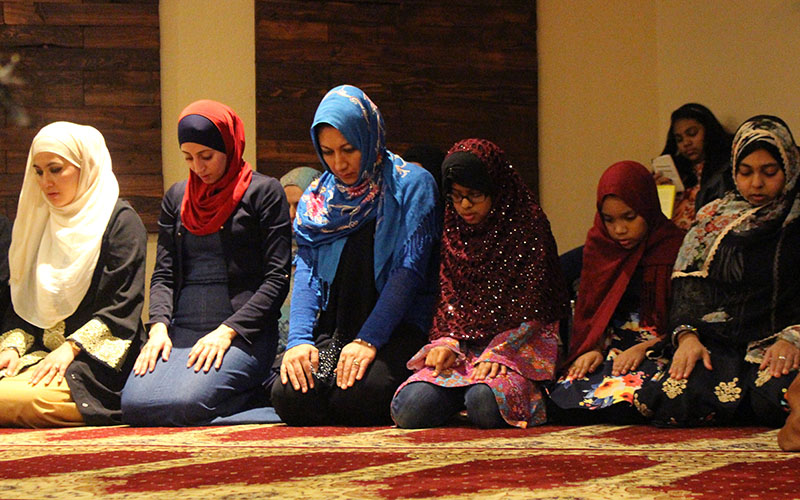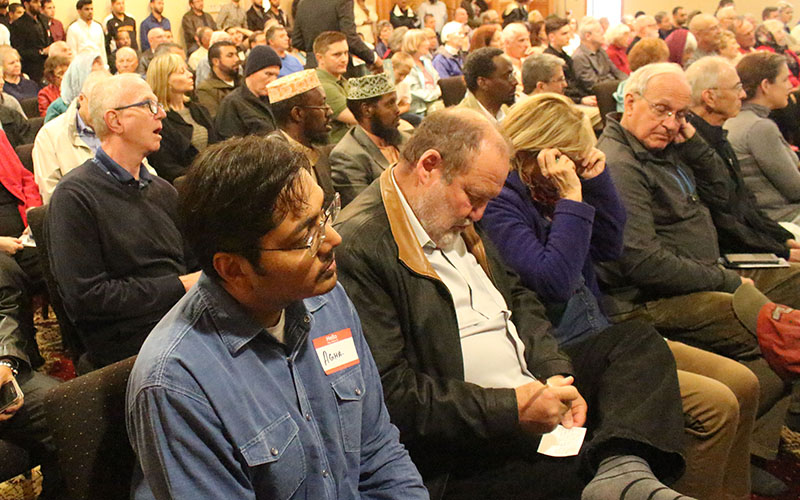
Women pray in the United Islamic Center of Arizona. The center held an open house to promote religious harmony and deepen understanding of Muslims. (Photo by Ethan Millman/Cronkite News)
GLENDALE – Glendale resident Steven Lane had always wanted to know more about the mosque that moved into the former church down the block.
Lane and two children joined 200 people of different faiths who walked into a mosque, placed their shoes against the wall and heard an Arabic prayer before listening to leaders discuss Islam. Listeners walked out knowing more about the centuries-old faith, dampening stereotypes about the religion’s juxtaposition to terrorism.
The United Islamic Center of Arizona opened the doors to the mosque near 35th avenue and Union Hills Drive last weekend to reveal information ranging from basic, such as differences between a Sikh and and a Muslim, to more complex questions, such as women’s rights within Islam.
“We wanted to let our children know that there’s a fear after 9/11 of Islam and ISIS and things of that nature,” said Lane, a non-denominational Christian. “The only way you can resolve that fear is with knowledge. If they’re opening their doors to us, the least we could do is be responsible and walk through that open door and see what they have to offer and what they have to say.”
Didmar Faja, the mosque’s Imam, said an open house is important because it allows the community to get a real sense of Islam, rather than what terrorist groups portray.
“The purpose is just to get to know people around us,” Faja told those gathered to hear a panel discussion. “Unfortunately, we live in times when there are certain organizations out there who portray Muslims here in America and around the world as people of terror and extremism. We feel sad when we hear words like that, because our faith stands for peace.”

People listen to a discussion at the United Islamic Center of Arizona’s open house. (Photo by Ethan Millman/Cronkite News)
Taj Jones, a center trustee, said in an interview the event was intended to reveal community connections.
“We’re actually more similar than you know,” Jones said. “You’d be surprised. Not only do we just bleed the same, we live the same. People that come here are people you go to school with. They’re your doctors, they’re your lawyers.”
Several Muslim and Christian leaders led the discussion and answered questions:
- What is Sharia law?
- What is the path to becoming an Imam?
- How should Muslims treat non-Muslims?
- How does the Quran’s teachings compare to Judeo-Christian teachings?
“Sharia law, is one of the scarier words, unfortunately, nowadays that you hear,” Faja said. “That’s unfortunately how they’re portraying it. But Sharia law is a very wide term. Sharia is about the practicing of a Muslim. My five daily prayers are based on the teachings of the Sharia. Smiling to a fellow human means I’m practicing sharia.”
Phoenix City Councilwoman Thelda Williams, who was on the panel, talked about religious tolerance.
“What we want to do is preserve religious freedoms, set up a safe environment for our families and we want to protect our children and make sure they grow up to be healthy human beings in a loving, kind world,” Williams said. “We work very hard on these objectives.”
Ann Range, an 83-year-old Glendale resident, came to the open house because she has Muslim friends in her book club and wanted to know more about the culture.
“The more we know about something, the better we can react to it,” said Range, an Episcopalian. “The more educated we are, the better we can respond to things that are going on. People have sent me some pretty terrible things because they know I’m friendly with Muslims. And I can have an answer for them.”